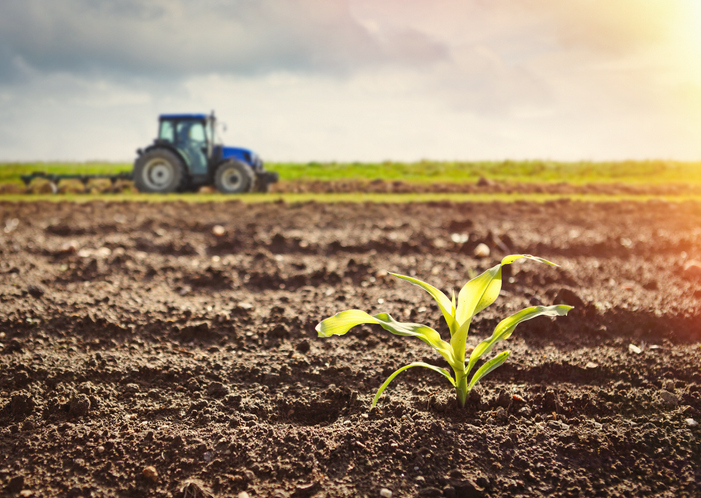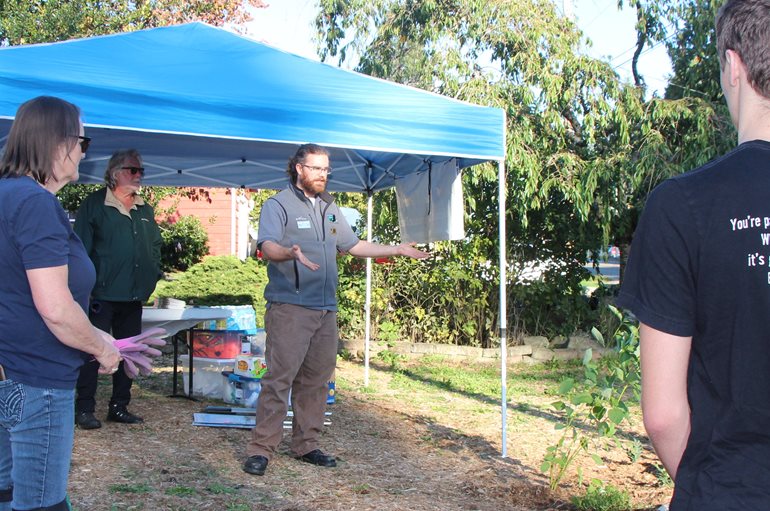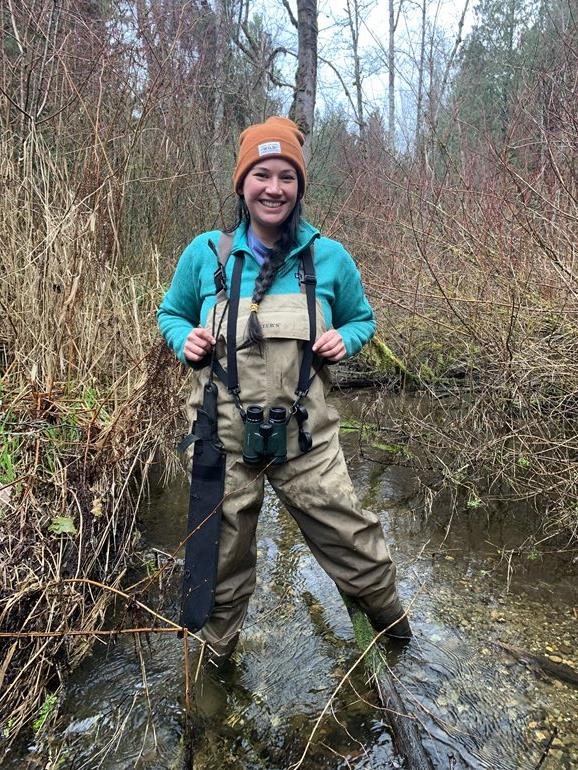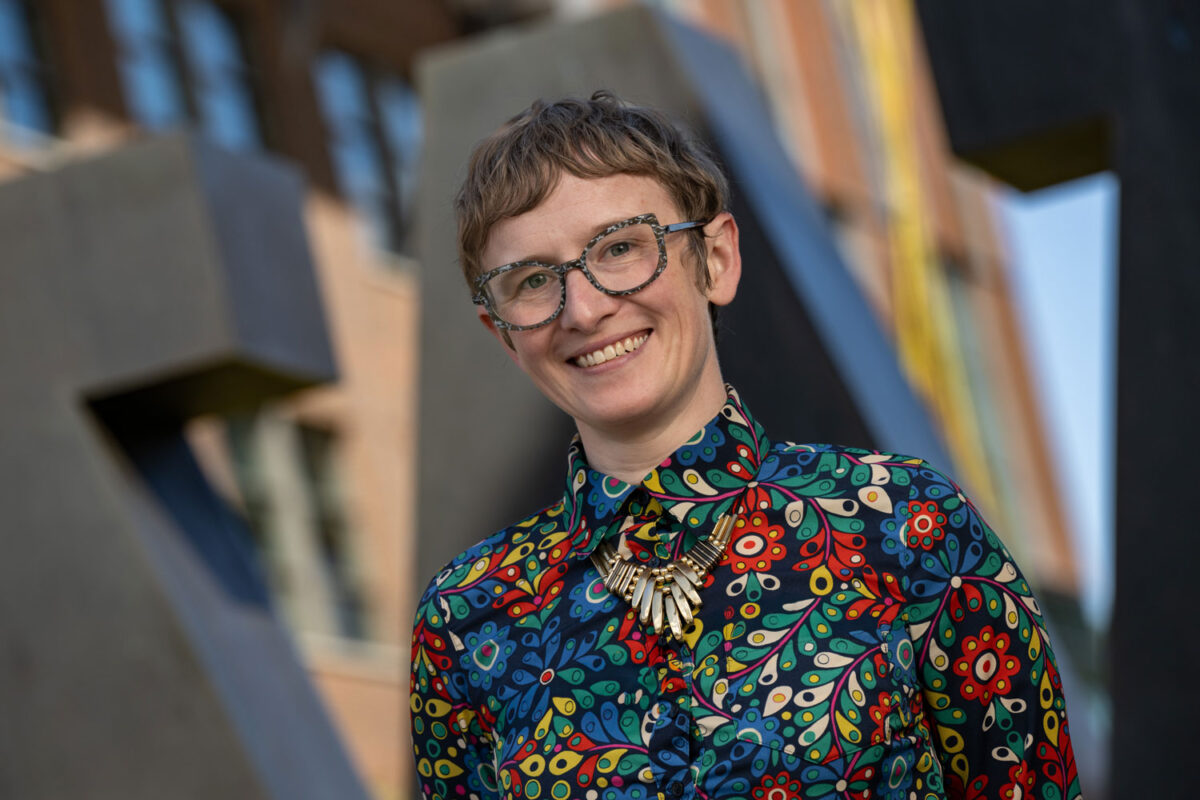
From classmates at University of Washington Bothell to friends to coworkers, Environmental Studies alumni David Jackson ’17 and Sara Rocero ’17 have a number of things in common.
For one, they were both raised to love the outdoors.
“I came from a family that had a deep appreciation for nature,” said Jackson. “My parents always encouraged us kids to play in the yard, get fresh air and run free. It’s a great parenting hack,” he joked, “because by the end of the day we were always exhausted.”
Rocero shares a similar love for nature and, in particular, for wildlife. “One of my favorite childhood memories was when my sister and I wrote former President Bill Clinton — who was in office at the time — to inform him that we were seeing deer in our neighborhood,” she said. “We were worried that they were losing habitat and that soon there would be nowhere for them to go.”
Given their backgrounds and their major, it’s no surprise Jackson and Rocero both ended up pursuing careers at the Snohomish Conservation District, a political subdivision of state government tasked with local implementation of conservation practices.
“Participating in work that takes care of the land makes me feel good about coming to the office each day,” Rocero said. “It’s a truly fulfilling career.”
Wet jeans and muddy boots
When Jackson first came to UW Bothell, he hadn’t planned on majoring in environmental science. Instead, he focused on getting a business degree.
But on a rainy day in February 2014, he changed his mind.
“I was taking a class that required water sampling from the North Creek Wetland. I remember it was freezing and that the rest of the class had left because it was too cold,” he said. “As I sat there continuing my measurements, I realized I was content and that there was nothing else I would rather be doing. When class finished that day, I went straight to the academic advising office. In soaked jeans and muddy boots, I told them I needed to change my major.”

His background in business has come in handy, though. Now the SCD’s community conservation program manager, he identifies grant opportunities, does grant writing and then manages the distribution of funds as investments back into the community.
“I definitely miss being out in the field all day, but I find joy in facilitating the work of extremely skilled, passionate and dedicated people who care a great deal about not just the environment or the county but specifically the work that they are doing,” he said. “They make all of the hard, behind-the-scenes work worth it.”
Science into service
Unlike Jackson, Rocero knew from the get-go that she wanted to major in Environmental Studies. What she didn’t know was how she would go on to use her degree.

“For a while, I thought I would be a technical scientist. I liked the idea of conducting my own surveys and testing my own hypotheses,” she said. “But as time went on, I realized that being so technical would be a barrier to the work I wanted to do. Most people don’t have a science background, and what I care about more than generating information is making it accessible to the public.”
So Rocero took a job at SCD, working as a member of the Veterans Conservation Corps Crew and of the outreach and communications team. “What I love most about my job is the community-based work I get to do. Part of my job is to educate the public,” she said. “A lot of folks don’t know there is a conservation district in their county, let alone that we offer free services.”
Before the coronavirus pandemic, Rocero would go door-to-door, informing people of the myriad ways the district can help to make their lives easier. For instance, if homeowners have issues with drainage, one of the district staff will come to their property and assist them for free. The staff also volunteer to weed people’s yards and can provide free trees for those who live adjacent to waterways — thanks in part to Jackson’s success getting grants.
“Basically, we’re letting the community know that anything natural-resource related, we can help with in some way,” she said.
Planting seeds of knowledge
In addition to canvassing neighborhoods, Rocero and other staff host events (now often virtual) to speak with members of the community on a variety of topics, one of which is the importance of native plants.
“Most people don’t know just how important they are,” she said. “Having them along waterways is particularly important as they filter out pollutants in soil and water. They also shade the waterways and lower the temperature, which is especially needed in the summer. The rise in water temperature is becoming a huge issue for fish, especially salmon, so we want to cool those temperatures and create healthier, more oxygenated water.”
In these talks, Rocero encourages attendees to incorporate more native plants into their gardens. “Local wildlife, insects, pollinators, mammals and birds have co-evolved with the native plants here for millions of years,” she said. “When we have fewer native plants, there are less food resources for wildlife to do what they need to do — live, reproduce and then die.
“Native plants are the foundation to our entire food web. They are vital.”
Gardening tips 101
With spring just around the corner, Jackson and Rocero are using their expertise to provide local gardeners with additional tips, encouragements and things they can start doing now — such as collecting rainwater.
They know stormwater is the number one source of pollution in the Puget Sound area. “When it rains,” Jackson said, “it moves down the roads and picks up all of the pollution from our cars and takes it into Puget Sound. By harvesting the rainwater, we are able to mitigate that runoff and instead infiltrate it into our soil. Plus, it saves people money on their water bill because they won’t have to use their hoses and tap into city water. It’s a win-win.”
For those looking to harvest rainwater, Jackson said to contact their local conservation district as most will provide barrels at no cost.
Jackson and Rocero also recommend gardeners start planting now and not wait until the spring or summer. Rocero explained that while May to August is the most popular timeframe for planting because the weather is nice, it is actually the worst time to start a garden.
“It’s much better to plant from October to April, which is the complete opposite of what most people do,” she said. “In winter months, there is an abundance of rain and thus of water. Your plants have double the success rate if planted in fall or winter than they do if planted in spring or summer.”
Jackson also emphasized the importance of using woodchip mulch. “Pro tip: If you remove a weed and put down the woodchip mulch, it will prevent the weed from growing back as quickly,” he said. “Use it with other plants, too. It keeps in moisture, making watering more efficient, and it keeps the soil temperature down. It slowly degrades and puts nutrients back into the ground.”
Lives in bloom
Both Environmental Studies alumni attribute their successes, in part, to UW Bothell.
“I couldn’t have gone to a better University to learn about environmental science. I mean, the campus itself is 50% wetland, which makes field work extremely accessible,” Jackson said. “Also, the campus’ green infrastructure is just phenomenal. If environmental science is your area of interest, there is no better place to study it than UW Bothell.”
Rocero echoed his sentiments, saying that “the professors were just amazing. They went above and beyond to help me and all of my classmates. This place will always have a special place in my heart.”



